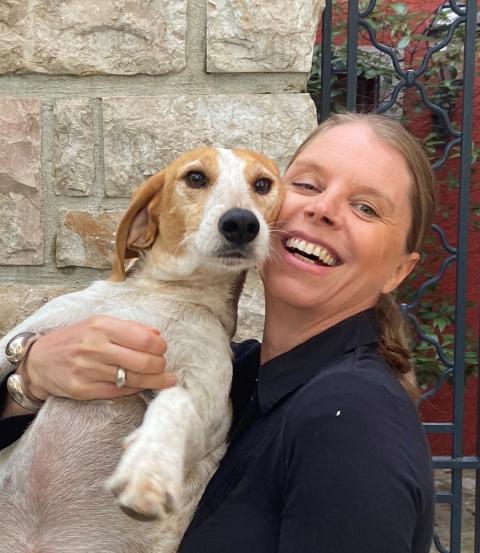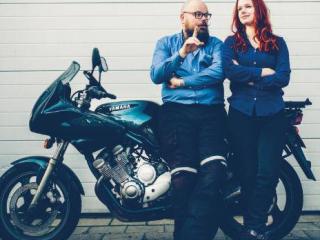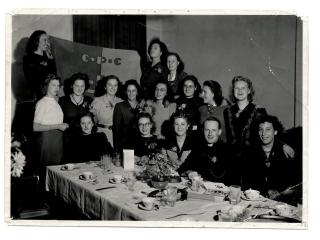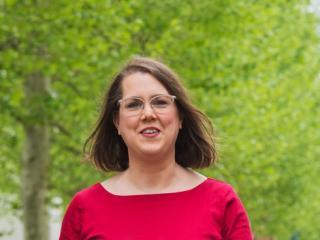Taboo breaking book: the beauty of fear
Alumna Saskia Kalb gave up a successful career as an economist. After many years of keeping up appearances as a self-confident woman, the façade collapsed and she experienced a burnout. Because well-meaning therapists could not help her, she went on to study psychology and embarked on a long search for information. She poured her knowledge and experience in a book: De schoonheid van angst [The Beauty of Fear], which she hopes will prevent or relieve the suffering of others. This is her story.
“I completed my studies in Tilburg with great pleasure and became a chartered accountant. However, it had been harder psychologically than intellectually. From the age of 16, I have had an anxiety disorder - phobias and panic attacks. It marked my life, which became a struggle.”
How do you look back on your time as a student?
“I am from a family of accountants and thought it was special to study in Tilburg because my father had studied law here for a couple of years before he focused fully on his accountancy firm. Moreover, my brother Peter, who studied Information Management in Tilburg, and I simultaneously completed our studies and the chartered accountant exam. It was special to be able to study together. I was impressed by the scale and the history of Tilburg University. I found the university very professional; the attitude struck me as American, in a positive sense: ambitious, purposeful, and high-quality education. As regards atmosphere, I found it very masculine, but that may also have been due to the type of program, I guess. Business Economics and Accountancy were still male-dominated environments. That made it perhaps even more difficult to talk about my feelings.”
How has your anxiety disorder affected your studies?
“The combination of part-time work as an assistant accountant and studying was difficult for me. I thought my fellow students were far more self-confident and efficient than I was and I struggled to keep up. I can remember that we had to hand in a hand-written Administrative Organization assignment every week that was returned with corrections the next week. I had really done my very best, but the teacher had written in big red letters 'If you go on like this, you'll never make it: I give you a 3’. I thought that was awful, because my self-confidence wasn't great to begin with, and it made me anxious; it put me on the verge of a panic attack.
Still, it helped me to find the energy to go the extra mile and pass the exam. But to come back to your question, I felt pretty lonely in my time as a student, because I was afraid to talk to anyone about my fears and insecurities. I thought I was an exception. Which was a pity because I now know that one in five Dutch people are confronted with an anxiety disorder at one point in their lives, so there must have been quite a few other scaredy-cats sitting next to me in the lecture halls.”
What can you tell about your career?
“My brother was much more suited to the profession, very intelligent, and most of all much more socially capable than I was, so he took over my father’s business. I am very proud of the fact that Kalb Accountants has existed for more than 80 years now, thanks to his efforts, but I was not cut out for entrepreneurship. After having worked in accountancy for five years, also thanks to my excellent education, I was chosen from among 300 candidates to work for an American multinational as a financial controller. I was extremely proud and gratified, and saw myself traveling between Houston and Singapore. I was finally going to show everyone what I was made of. But I got panic attacks and did not feel up to it. I canceled the job at the last moment and opted for a safer alternative: Heerlen instead of Houston.

It was a fun job, by the way. I was a financial controller in the investment properties department at ABP, and more importantly, I met my husband there, so privately those panic attacks had a silver lining. After that, I moved on to EY Corporate Finance in Antwerp. In that job, I was asked if I was interested in joining ING’s think tank, a dream job, so I really must have done something good.
But I also sabotaged that opportunity because I feared the panic attacks, and because I didn't think I was good enough. In the end, my husband and I left for Monaco where he had a good job in banking. I ended up in the Family Office world of superlatives, of butlers, private planes, top models, and super yachts. At first, I found it rather interesting, but soon realized that this lifestyle did not suit me. The superficiality, the materialism, and the pretense. Although it fascinated me, I became increasingly disenchanted.
My façade of self-confidence and success came tumbling down and I got a burnout. I temporarily quit working and took some time for self-reflection. Eventually we moved away from Monaco, to a place in France on the Italian border, and I now have a wonderful life. We live on the edge of a forest with our three dogs. Animals and nature proved to be enormously important to me in finding and maintaining my balance. I continue to work in the financial sector, on a very modest scale – thanks to my educational background, it will always be easy to find a job that pays well – but my volunteer work in a dog shelter in Italy is the most rewarding and meaningful work I have done so far.”
Why did you decide to study psychology?
“Because different counselors, from psychotherapists to cuddle coaches, had not been able to help me, I decided that it was time to find out for myself what ‘possessed’ me. The psychology program was very interesting. I learned about how inner conflicts and dysfunctional defense mechanisms can lead to anxieties.
However, my studies in philosophy, sociology, organization science, and the Kabbalah brought me more insight, or at least insights that suited my experiences. Namely, that you should not fight anxiety, but must learn to embrace it. You can use it in a positive sense. I can now accept my anxiety as a valuable part of myself, as a motivator and advisor, and I now know that I am a lot stronger than I had always thought. That my anxious, vulnerable side is also my strength.”

‘Learning to know anxiety is an adventure which every man has to embark upon.’
Søren Kierkegaard, 1844; the motto of Saskia’s book
Why did you decide to write a book?
“Since my research had cost a lot in terms of time, money and effort, I thought it was a shame if it would only benefit myself. I want to make people resilient, so that they are able to choose what type of therapy would fit them best and, if at all possible, to take care of their own psychological well-being without ending up on waiting lists. And I want to break the taboo by cultivating understanding and tolerance.
So in my book, I first clearly describe what it feels like to live with an anxiety disorder. I tried to be as open as possible and also describe the embarrassing situations that I experienced. Then I try to make clear the various functions of fear according to a certain approaches. Fear always has a function that can be very different, for example, from a psychological, philosophical, biological, or art perspective. A psychologist may say you are anxious because of childhood trauma, while a supporter of the Kabbalah may say you are suffering from megalomania. Finally I give help to deal with fear in a constructive way.”
Was it hard, writing that book?
“It was at first, because I had to remember painful memories, which increased by susceptibility to anxiety. But in the end, I think I was able to get things clearer in my mind. It was a long haul, there's maybe ten years of research that went into it.
It was not very easy either to send the manuscript to an editor ... I doubted very much whether or not I should go ahead. I'm an introvert and I valued my privacy so it wasn't easy to expose myself like this, wrinkles, scars and all. But I've always told myself: if only one person benefits from my book, I’ll be glad I was able to alleviate this suffering. Because suffering from an anxiety disorder can be really unpleasant and even crippling. In the end, I wrote the book I had wanted to read myself when I was 30."
Wat are you most proud of in the book?
“That, shortly after publication, there were already several people who reported that they had learned from it. That the book had helped them, that's the most important thing. But also that my brother thought it was a good book. After all, it's also about his life for some part – unfortunately our parents passed away almost fifteen years ago, so I can't ask their opinion. But also that a serious publisher like ISVW wanted to work with me and that a newspaper like Trouw found my story interesting enough to publish an interview!”
Who should read your book?
“Everyone! Well, I think mainly people who suffer from an anxiety disorder and their loved ones. Or people who worry excessively and want to better understand their inner demons. But I would especially like HR staff and team leaders to read the book so that they can better understand and value their anxious employees. In my book, I describe a large number of studies that show that people who are socially anxious are often above average intelligent, have a sharply developed feeling for assessing risks and the intentions of other people, have a great problem-solving abilities, and many more valuable qualities. If I were a manager, I would always want to have at least one employee with a fearful disposition in my team for this very reason.
Finally, I would really like Education Minister Arie Slob to read my book. If anyone knows him personally perhaps ...? I would like students to be taught basic psychology. That they learn what fears there are, how 'normal' it is to be afraid, and how to deal with it. It would cultivate more tolerance and possibly more resilience and may prevent serious mental illnesses. In any case, it would surely have saved me a hard struggle.”
Date of publication: 10 January 2020



